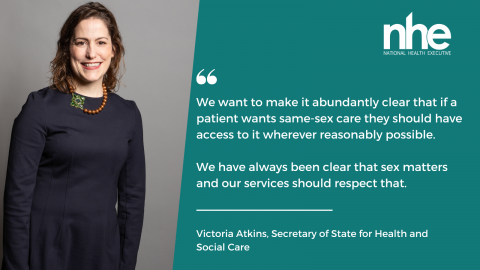The NHS has urged the government to seize its “once in a decade opportunity” to reset its relationship with patients, following an announcement from the Department of Health and Social Care (DHSC) on a new consultation for updates to the NHS Constitution for England.
The NHS Constitution – a document outlining the rights of patients and staff – was first published in March 2012 and has to be updated at least once every 10 years by the health secretary.
The DHSC says its plans for the constitution centre around improving the privacy, dignity and safety of patients.
The new proposals include empowering people to request that intimate care is carried out by a clinician of the same biological sex – when possible.
It is also reinforcing the commitment to providing single sex wards, including the idea that putting transgender patients in single-room accommodation is permissible under the Equality Act 2010, when it is appropriate.

Other government proposals include:
- Embedding Martha’s Rule
- Understanding the root causes of health inequalities and collaborating to level out access, experience and outcomes
- Strengthening patient responsibilities to cancel or reschedule appointments, and on the NHS to communicate appointment information clearly
- Ensuring patients expect that physical and mental care will be person-centred, coordinated and tailored
- Reinforcing the NHS’s commitment to unpaid carers
Sir Julian Hartley, the CEO at NHS Providers, has emphasised that any changes must have inclusivity and eliminating discrimination at their heart.
He said: "This consultation marks a once in a decade opportunity to review and reset the NHS' relationship with patients.
"Trust leaders are committed to creating a responsive and effective NHS which meets the current and future health needs of all the patients and communities they serve.”
The consultation will run for eight weeks and signals the first stage of the review process for the constitution. The DHSC says it will consider insight from everyone including the public, clinicians, patients, caregivers, and others.
CEO at the NHS Confederation, Matthew Taylor, adds that a focus on high-quality care for all needs to remain the focus and the NHS is not drawn into “pre-election culture wars”. “This is not where energies should be focused,” he said.
Regardless of what changes are made, Matthew highlights they must be “clear and workable” to avoid ambiguity and therefore inconsistency in provision at local level.
“Since the NHS Constitution launched, it has helped to shift the balance of power from services towards patients and their families,” said Healthwatch England’s CEO, Louise Ansari.
“But, with only a third of people knowing their rights, there is still a long way to go. Given the challenges our NHS faces, a conversation to reaffirm and raise awareness of the most important rights to the public has never been more timely.”
Image credit: iStock



















